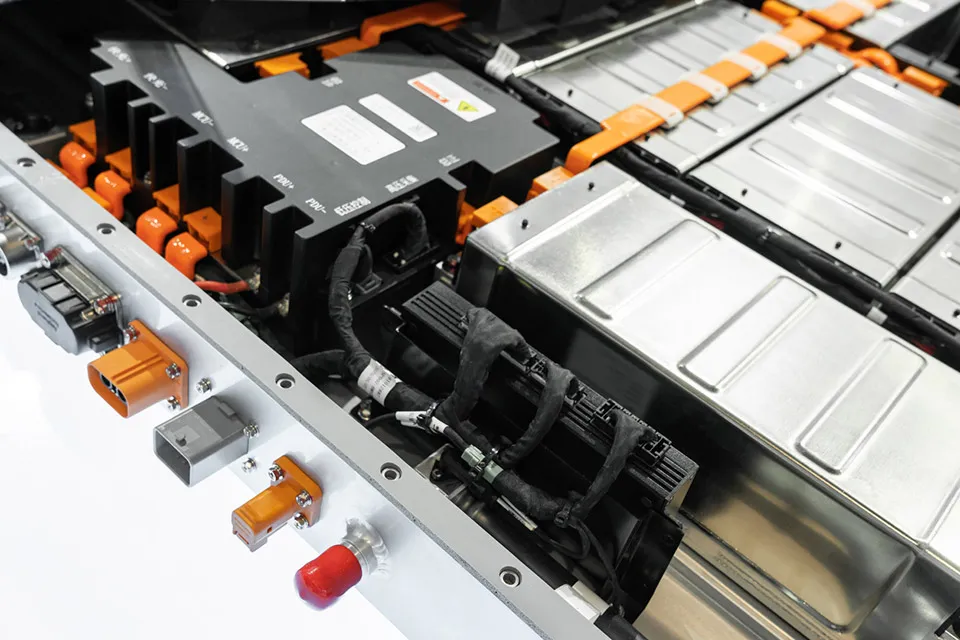- What Type of Batteries Do Electric Cars Use?
- What Are Electric Car Batteries Made Of?
- What Type Of Batteries Are Used In Electric Cars
- Factors to Consider When Buying an Electric Car Battery
- How Long Do Electric Car Batteries Last?
- How To Extend EV Battery Life
- Additional Resources for Education on Electric Car Batteries
What Type of Batteries Do Electric Cars Use?

As electric cars become increasingly popular worldwide, it's important to understand their battery technology. From lithium-ion batteries and fast charging systems to developments in range and energy efficiency, GoodCar will help you make sense of the different EV technologies and their potential impact on our environment.
What Are Electric Car Batteries Made Of?
To understand the different EV battery technologies, it is first important to understand how a battery works. An EV battery is made of one or more cells that store electrical energy in the form of chemically stored energy. When a cell is connected to an external circuit, it can discharge its stored energy through the circuit. The cells are connected so that they work in series and/or parallel to create higher voltages and increase the amount of charge that can be stored (i.e., amp-hours).
The most common types of cells used in batteries are lead-acid, nickel-metal hydride (NiMH), and lithium-ion (Li-ion). Lead-acid batteries have been around for over 150 years and are the least expensive type of battery, but they are also the heaviest and have the shortest lifespan. NiMH batteries were developed in the 1980s as an improvement over lead-acid batteries and became popular in hybrid vehicles; however, they have since been eclipsed by Li-ion batteries. Li-ion batteries were first commercially used in 1991 and have become the standard for electric vehicles due to their high energy density (i.e., more power per weight), long life span, and low self-discharge rate (i.e., they hold their charge better than other types of batteries).
What Type Of Batteries Are Used In Electric Cars
Electric car batteries come in a few different chemistries. The three most common types of EV batteries are lithium-ion, nickel metal hydride, and lead acid. Each has its advantages and disadvantages.
Lithium-ion batteries are the most popular EV battery type. They have a high energy density, which ultimately means they are able to store a large quantity of energy in a relatively small compartment. They also have a low self-discharge rate, losing little power when unused. Lithium-ion batteries are also relatively lightweight and have no memory effect, meaning that you can recharge them at any time without reducing their lifespan. However, lithium-ion batteries are the most expensive and can be damaged by overcharging or extreme temperatures.
Nickel metal hydride batteries are the second most popular EV battery type. They have a slightly lower energy density than lithium-ion batteries, but their main advantage is that they're much cheaper to produce. Nickel metal hydride batteries also don't suffer from the same temperature sensitivity as lithium-ion batteries, making them more tolerant of extreme weather conditions. However, nickel metal hydride batteries have a higher rate of self-discharge than lithium-ion batteries, which means they lose their power more quickly when you are not using them. They also have a memory effect, meaning they must be fully discharged before recharging to maintain their lifespan.
Lead acid batteries are the least common type of battery for electric cars. They're much heavier than the other two types of EV batteries but also much cheaper. They also have a higher self-discharge rate than lithium-ion or nickel metal hydride batteries, so they will lose power more quickly when not in use. Lead acid batteries are generally considered unreliable and less efficient than the other two types of EV batteries. When these types of batteries are used in an electric or hybrid vehicle, it is typically to maintain secondary systems.
Factors to Consider When Buying an Electric Car Battery
When you are shopping for an electric car battery, there are several factors that you will need to keep in mind. The first is the type of battery technology that you want. Three main types of technologies are available on the market: lead acid, nickel metal hydride, and lithium-ion. Each has its own advantages and disadvantages that you will need to weigh before making a decision.
The second factor to consider is the size of the battery. Electric car batteries come in various sizes, so you must determine which size suits your needs. The size of the battery will dictate how much range you can get from your vehicle and how long it will take to charge your electric car.
The third factor to consider is the price. Electric car batteries can range in price from a few hundred dollars to several thousand dollars. You will need to decide how much you are willing to spend on a battery before purchasing.
How Long Do Electric Car Batteries Last?

Electric car batteries are long-lasting and durable. On average, electric car batteries can last for about eight years or 150,000 miles before you must replace them. However, this can vary depending on the type of battery you have, how you use it, and how well you maintain it.
For example, lithium-ion batteries typically last about ten years or 200,000 miles. If you live in a hot climate or frequently use your car for long road trips, your battery may not last as long. Conversely, if you take good care of your battery and only use your car for short trips around town, it could last much longer than average.
No matter what type of EV battery you have, there are several things you can do to extend its life:
- Avoid extreme temperatures: Extreme heat and cold can shorten the lifespan of any type of battery. If possible, park your car in a garage or covered parking area to protect it from the elements.
- Limit short trips: Frequent starting and stopping strains your battery. If possible, combine errands into one longer trip instead of making several shorter ones.
- Turn off unnecessary lights and accessories: Anytime your car is turned on, all its electrical systems are working and draining power from the battery. Turning off unnecessary lights and accessories will help preserve power and prolong the life of your battery.
How To Extend EV Battery Life
All types of electric car batteries require very little maintenance compared to gasoline car engines, and there are no fluids to check or change and no tune-ups required. However, there are a few things you should do to keep your battery in top condition:
- Keep the battery clean and free of dirt and debris. A dirty battery can cause decreased performance and shortened lifespan.
- Check the terminals regularly for corrosion and clean them as needed. Corroded terminals can cause charging problems and reduce the battery's overall life.
- Make sure the vent tubes are clear and unobstructed. These tubes allow gases to escape from the battery during operation, and if they're blocked, it can cause the battery to overheat.
- Store your electric car in a cool, dry place when not in use. Extreme temperatures can shorten the lifespan of your battery.
Additional Resources for Education
on Electric Car Batteries
In addition to the resources provided in the blog article "What type of batteries do electric cars use?," there are a number of additional resources available for those seeking to learn more about electric car batteries.
The U.S. Department of Energy's Office of Energy Efficiency and Renewable Energy provides various resources on electric car batteries, including an overview of EV battery technology, information on types of EV batteries, and a list of manufacturers. In addition, the Alternative Fuels Data Center provides information on electric car charging infrastructure and stations.
Electric car batteries have come a long way in recent years, with different technologies being developed to offer more efficient and reliable performance. Understanding the difference between each type of EV battery technology can help you decide which one is best for your needs. At GoodCar, we hope that we were able to shed some light on electric car battery technologies and help you get closer to selecting the right one for you. If you are looking into purchasing a used electric vehicle, we recommend you use the GoodCar Vehicle History Report to check on the battery maintenance of any prospective vehicle you are interested in.
- What Type of Batteries Do Electric Cars Use?
- What Are Electric Car Batteries Made Of?
- What Type Of Batteries Are Used In Electric Cars
- Factors to Consider When Buying an Electric Car Battery
- How Long Do Electric Car Batteries Last?
- How To Extend EV Battery Life
- Additional Resources for Education on Electric Car Batteries
FREE Vehicle Search
- Accidents
- Problem Checks
- Title Records
- Recalls
- Values
- Specs
-
InfoPay, Inc. (dba GoodCar) is an Approved NMVTIS Data Provider
-
-























